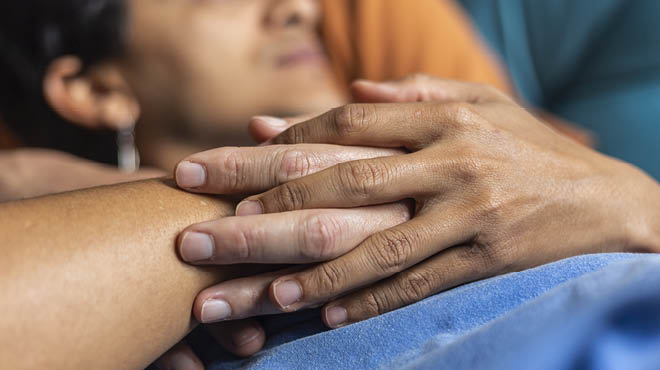Tailoring substance use recovery for LGBTQ+ people

People in the LGBTQ+ community may face specific health concerns, including a higher risk of substance misuse than people who identify as heterosexual.
According to the National Institutes of Health, LGBTQ+ people are more than twice as likely to use marijuana, opioids and alcohol than the overall adult population. They have a greater risk of suffering from a substance use disorder, also called alcohol abuse or drug addiction.
Substance use disorder
A substance use disorder is a disease that affects the person's brain and behavior, leading to the inability to control the use of the preferred legal or illegal substance. Often, the substance use starts as an experiment in a social setting and a way to escape reality.
For some people, drug and alcohol use becomes more frequent over time and progresses to a point where larger doses are needed and it's increasingly difficult for them to go without it. This can lead to problems at school or work, money issues and changes in their behavior or physical appearance.
Contributing factors
People of any age, economic status or sexual orientation can develop a substance use disorder, but LGBTQ+ people have an increased risk. There are many factors that may influence this, including the challenges they face with social isolation, discrimination, harassment, lack of support and social stigma. The pressure and fear surrounding their sexual orientation, particularly if they haven't come out to their family or friends, can lead to feelings of shame and guilt.
LGBTQ+ people have a higher risk for anxiety, stress and depression as well. These conditions often occur together and can stem from the challenges and discrimination this community faces. These conditions also can increase a person's risk for substance use disorder.
For many people, misusing substances becomes a way to numb negative emotions and offers a temporary escape from daily stress and challenges. They rely on substances as a primary coping mechanism, mainly because they don't have other healthier options. However, this can create a cycle where substance use worsens mental health symptoms, leading to an increased desire to numb feelings and perpetuating the reliance on substances.
Commonly used substances
Alcohol, marijuana, opioids and methamphetamine are commonly used by LGBTQ+ adults. In 2020, 21.8% had an alcohol use disorder, 41.3% used marijuana and 6.7% misused opioids, according to the National Institutes of Health. Comparatively, heterosexual people had lower reported rates of 11% for alcohol use disorder, 18.7% for marijuana use and 3.6% for opioid misuse.
Methamphetamine has become a popular "party drug" and often is used with other substances. Opioid use is growing as well, including using painkillers like fentanyl and Percocet.
People may use one substance exclusively or combine them. The type of substances they use varies based on what's available in each person's community and through their social networks.
Typically, substance use is higher in young people and gradually declines with age, regardless of sexual orientation. Younger people tend to progress with substance use more rapidly, while the progression for older people is slower.
Substance use rates for LGBTQ+ people may be higher in the early stages of self-discovery but decrease as they develop stronger support networks and experience social acceptance and increased comfort with their sexual identities. It's crucial to recognize substance use patterns early and provide appropriate, timely support.
Tailored treatment plans
Treating substance use doesn't take a one-size-fits-all approach. While all plans include agreed-upon goals, scheduling details and relapse-prevention strategies, other components are customized for each patient regardless of sexual orientation. Some plans focus more on addressing mental health while others build on environmental or social factors.
A counselor can help identify substance use support group options. This can be an important step toward recovery and maintaining sobriety. In-person groups are effective, but not practical for everyone, so now there are many virtual options. These can be especially helpful for people who live in rural areas, have transportation challenges or have difficult schedules.
Finding the right support group can take some time.
Here are some tips for LGBTQ+ people looking for an inclusive and accepting substance use support group:
- Consider your personal preferences.
Support groups are available in many sizes, compositions and settings. Spend time thinking about what would be best for you. For example, some people prefer larger group sessions that allow them to listen quietly and not talk. Others want smaller groups that allow for more intimate discussions. Do you want a same-sex or mixed group? Virtual or in-person? Exploring multiple options can increase your chances of finding a supportive community that meets your needs. - Look for a specialized group.
There are many support groups that cater to specific needs or circumstances. In addition to groups tailored for LGBTQ+ people, there are options for veterans, specific religious beliefs, substance type, people with dual diagnoses and for family members.
- Ask for recommendations.
Peer support can be crucial in recovery. Connect with LGBTQ+ people who have experience with support groups or are in recovery themselves. They can provide firsthand recommendations and insights based on their own journeys. You can also ask your counselor for recommendations. - Give it a chance.
Attend several meetings to get a sense of the atmosphere, group dynamics and the support offered. Pay attention to how members interact, the level of participation and if the group provides a safe and welcoming environment.
While substance use is higher among LGBTQ+ populations, there's reason for hope. Sobriety and recovery are possible, and many addiction treatment programs are committed to providing individualized care in inclusive and supportive environments for all people.
Talk with your health care team if you're concerned with your substance use. They can help guide you to sobriety and recovery.
Holly Louwagie is a Fountain Centers alcohol and drug counselor in Albert Lea, Austin, Fairmont, Faribault, Mankato and Owatonna, Minnesota.



